Great Works, Troubling Moments
The controversy surrounding Dragon's Crown inspires the question: Does one rotten element ruin the entire experience?
This article first appeared on USgamer, a partner publication of VG247. Some content, such as this article, has been migrated to VG247 for posterity after USgamer's closure - but it has not been edited or further vetted by the VG247 team.
A few days ago, my wife Cat finally sat down with me to show me one of her all-time favorite movies, Breakfast at Tiffany's. It proved to be a touchingly melancholic piece of cinema -- as you might expect of a film based on Truman Capote's work -- featuring Audrey Hepburn in one of her more unusual roles.
Where Hepburn typically played the part of the wide-eyed ingenue, Breakfast cast her in a different light: A calculating party girl who fled to New York to escape her small-town past and her childhood marriage to a kindly but uncomplicated older man. Eager to divorce herself from her humble roots, she takes on the role of social-climbing "companion," spending time with wealthy men in return for lavish gifts and generous cash allowances.
And yet, the title betrays the underlying unhappiness of her existence, which becomes evident in the film's opening moments: As she makes the walk of shame home through Manhattan's empty streets at dawn, decked in the previous evening's party apparel, she enjoys her "breakfast at Tiffany's." That is to say, with a pastry and coffee in hand, she drifts slowly past the luxury retailer's window displays, admiring their wares and longing for a life of opulence that in reality she can only flirt with. And yet, as she says, you can never be truly sad as long as you're eating breakfast at Tiffany's.
The solitude of her evocative opening reverie is promptly shattered when she reaches her apartment and her landlord, Mr. Yunioshi, begins screaming at her. The real jolt doesn't come from Yunioshi's ranting, though, but rather from the fact that the landlord in question is caucasian actor Mickey Rooney playing the role of a Japanese man in a gross caricature straight out of World War II-era propaganda. It's practically Asian blackface -- he squints his eyes and wears a bucktoothed mouthpiece, shouting in coarse dialogue that sounds much more like Mario-style "what's a-matta you?" mock-Italian than any Japanese accent I've ever heard.
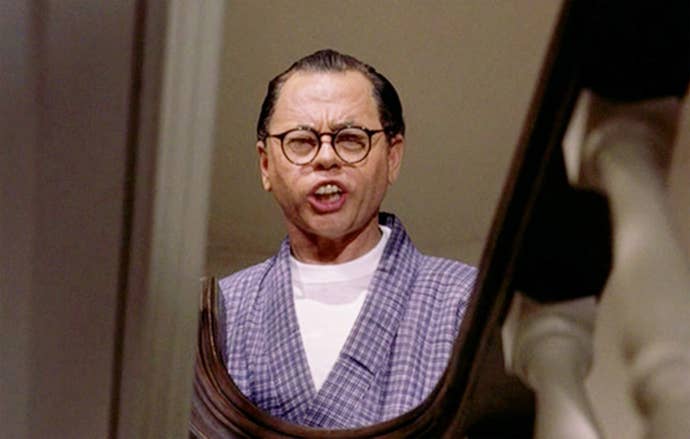
Rooney's performance would have been uncomfortable enough to watch under any circumstances, but what made it especially awkward was the fact that my wife is Vietnamese. I wasn't only cringing at the fact that Rooney was practically putting on a minstrel show, but also at the fact that Cat has told me about being on the receiving end of this exact kind of mockery and racism -- kids calling her names as they pulled the corners of their eyes taut -- growing up as one of the few Asians in a predominantly white neighborhood in Queens.
What surprised me, though, is that during every scene featuring bumbling, bucktoothed Mr. Yunioshi, Cat didn't seem angry or offended. Instead, she had an apologetic look about her the entire time -- an apology directed at me. Even though the movie featured "my" people mocking "her" people, she kept cringing for my sake. Her expression read as a mix of "Can you believe this?" and "Sorry about this."
This experience was on my mind a couple of days later as reviews of Atlus' Dragon's Crown hit the Internet. A brawler in the old-school tradition -- its key designer, George Kamitani, worked on Capcom's Dungeons & Dragons duology, and the similarities couldn't be more blatant -- Dragon's Crown has sparked quite a bit of online controversy thanks to Kamitani's character designs. Specifically, his designs for the Sorceress and Amazon characters, which exaggerate female sexuality to a nearly comical degree.
Which is the point, I think. Dragon's Crown is meant to be at once a fond homage to and self-aware send-up of classic fantasy tropes, and the entire game's visual design approach comes off as Frank Frazetta's style finished with Boris Vallejo's technique. It's stunning, but it's also deliberately ridiculous. Male characters demonstrate just as much exaggeration as the women do, their bodies inverted triangles of muscle mass and armor that mock the worst excesses of comic book superhero art.
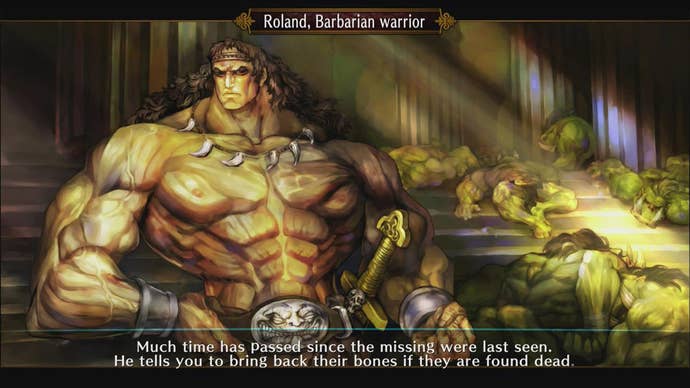
Of course, the problem here -- as with comic books -- is that the exaggeration of the men tends to emphasize their power and intimidation, whereas the focus on the ladies isn't on muscles or combat prowess but rather their sexual attributes. The Sorceress struts around in a low, lacy top that causes her tremendous breasts to bounce freely in a fashion that must surely make any female observer wince in sympathetic discomfort. The Amazon, on the other hand, appears every bit as beefy as her male counterparts, but where the guys sport plate armor that could double as a bank vault door, her ensemble consists of a tiny bikini. The Sorceress looks for all the world like a riff on Final Fantasy X's voluptuous black mage Lulu, while the Amazon's red-trimmed chain mail serves as a dual homage to Red Sonja and Tyris Flare. The point comes through, but their over-the-top appearance and stark contrast to the their male counterparts begs the question: Why the double standard? Do genre conventions justify this sort of dual treatment?
And even if so, it's not all as simple as mere spoof; Kamitani's personal fixations are clearly on display here as well. He's notorious for his love of buxom, thick-legged women and risqué tableaus. Consider his notorious illustration for Muramasa: The Demon Blade, which features heroine Momohime fighting an octopus in a short kimono and seemingly about 10 seconds from going full-on "Dream of the Fisherman's Wife." The obvious element of self-gratification undermines Dragon's Crown's parodic slant for many people.
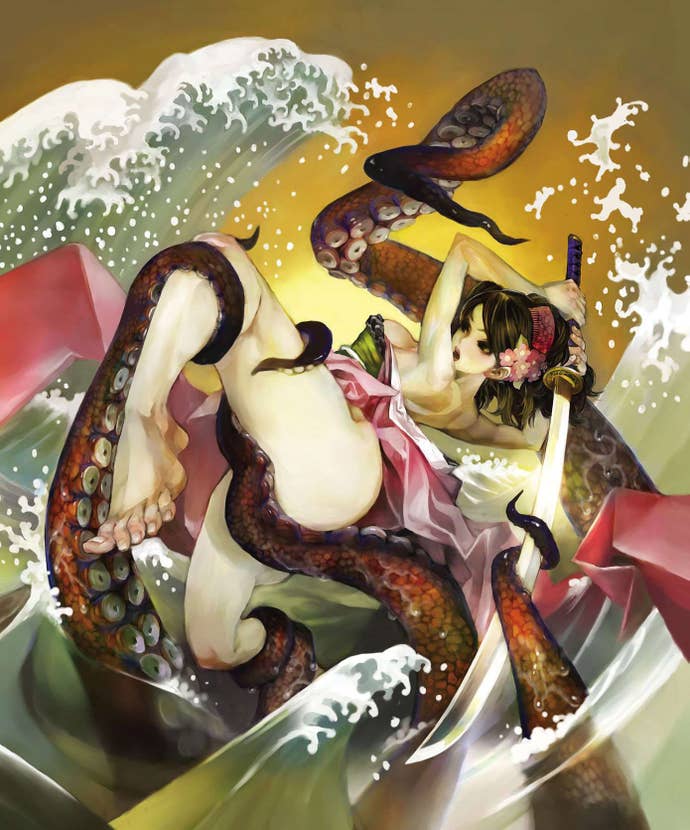
In fact, if reviews are anything to go by, Dragon's Crown's art style affects everyone. Of the half-dozen reviews I've read, every single one dwelt on the artwork. Responses range from our own "that art style is a thing that exists, and you may well hate it" to Venture Beat's exhortation to look beyond the art and enjoy the game for its intrinsic merits to Polygon's unhappy excoriation of the game's treatment of women. All of these are valid positions and seem like sincere reactions on the behalf of each reviewer, whether enraged or unfazed -- fair criticism all.
More concerning is the frequency with which commenters have chosen to speak not for their own feelings on their matter, but rather for their assumptions about how others will feel. How dare this game alienate 50% of the population! has been a popular theme in criticism directed towards Dragon's Crown, seemingly predicated on the assumption that women are universally offended by the Sorceress and men are universally wagging their tongues in delight. Not that there haven't been plenty of equally obnoxious remarks coming from the other side, of course; as with any sort of controversy within gaming culture these days, scores of gamers have taken up the mindset of, I'm not offended, so who cares if someone else is?
here's probably nothing to be done about the latter -- insensitivity is coded into the Internet's DNA, after all -- but the patronizing mindset of the former group seems born of good, if misguided, intentions. I've spoken with a number of women who couldn't care less about the game's most excessive art, or who can easily look beyond it to see the merits of the game within (VentureBeat reviewer Jasmine Rea probably foremost among them). On the flip side, I know quite a few men who can't, and who have no intention of supporting Dragon's Crown.
I couldn't help but think of my Breakfast at Tiffany's experience as I read Rea's review. My wife's apologetic reaction to its comical racism quickly made me realize that my initial impulse -- to be offended for her sake -- was as misguided as Rooney's performance. After all, she had been the one to recommend we watch the movie, well aware of both the good and bad. In fact, she considers it one of her favorite films. She despises Rooney's character, but she loves the way the rest of the story mingles melancholy with hope. For her, the strengths of the film outweighed its offenses enough to make her to want to share it with me.
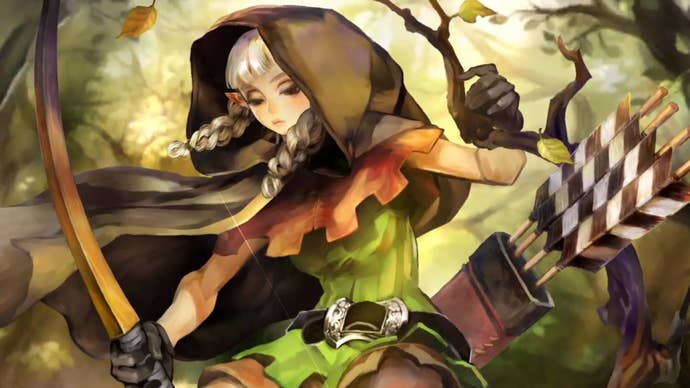
Like Rooney's slapstick insensitivity, Dragon's Crown was forged in a cultural crucible not quite identical to our own. In the movie's case, you have to remember the Hollywood of 50 years ago reflected different standards and different sensitivities than modern movies (though certainly today's movies are far from flawless when it comes to racism and sexism). Similarly, Dragon's Crown reflects Western fantasy clichés run through the blender of Japanese culture and regurgitated in a familiar but decidedly changed form. That's not an excuse for whatever social ills it may perpetuate, and it certainly doesn't mean everyone should simply accept it at face value. But it does explain why and how it seems so out-of-sync with the expectations of the American portion of its audience.
As for myself, I'm willing to take a wait-and-see perspective on Dragon's Crown. Helpfully, my preference of character class for this sort of game -- small, nimble, ranged fighters -- is represented by the Elf, whose design is considerably more tame than that of her sisters-in-arms. I'm not a huge fan of the other female character designs, but they're more eye-rolling than game-destroying for me. I've seen far worse depictions and treatment of women in games in recent years, though it's usually more insidious and subtle than Dragon's Crown skimpy costumes, which put its bad behavior front-and-center in a package that makes for easy Internet absorption and declamation. Not that "it could be worse" is anything like justification; that's simply where my point of view comes from.
Maybe I'll find something to love in Dragon's Crown as I play more of it, and maybe not. Either way, I figure the artistry on display justifies giving it a chance: By most accounts, it's a very beautiful game... and a very smart one, too. Besides, I'm familiar with the concept of loving a creative work despite a troubling element. Sometimes it works out, sometimes it doesn't.
As an example, consider Royal Space Force: Wings of Honneamise, one of the most gorgeous animated films ever created. A fascinating combination of 2001 and The Right Stuff, Honneamise is set in a militarized agrarian society reminiscent of pre-World War II Japan, though more advanced: It's right at the cusp of achieving manned space flight. It's a slow, meaningful movie... and midway through, the protagonist unexpectedly forces himself on the female lead in the middle of the night. She manages to fend off the rape attempt, but it's a jarring moment that completely shatters my respect and sympathy for the so-called "hero." And yet, I still think it's a fantastic movie, despite the innate wretchedness of its main character. But I can certainly understand why others might disagree.
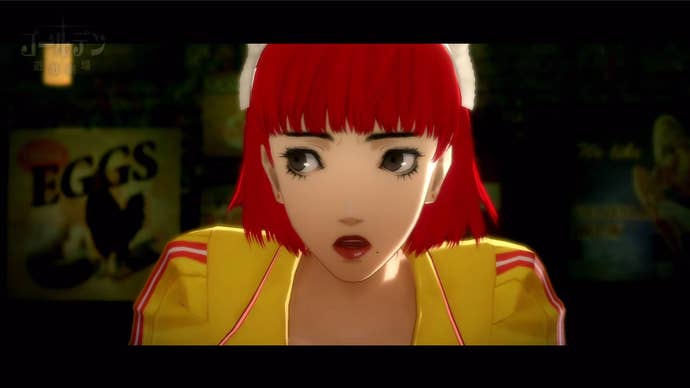
Likewise, Catherine -- a game developed by none other than Dragon's Crown publisher Atlus -- has a lot of smart, meaningful things to say about sexuality and maturing into adulthood with a loving partner (or choosing not to, for that matter). Despite its seemingly exploitative marketing, Catherine addresses very adult, very human matters of sex and love rarely explored in mainstream video games. Unfortunately, it also features a transgender character whose sexual identity is treated as a gross-out punchline. The fact that it even dares to include a transgender woman as an otherwise sympathetic character represents a far more open point of view than any game I can think of outside the purview of the indie scene, but it utterly botches its attempt at progressiveness. I can forgive this failing in light of everything else that Catherine dares to do -- but again, I can definitely understand where others wouldn't.
Despite all the nastiness that's bubbled forth on both sides of the Dragon's Crown debate this week, I'm glad it's happened. Plenty of good has come from all these conversations, not least being my former 1UP.com colleague Jenn Frank being inspired to launch an indie game design project called Boob Jam with the dual objective of making men more aware of the realities of living with breasts while encouraging women to take pride in their own bodies.
But even more than that, the fact that the discourse surrounding the medium can enter the same realm of the debate as that around classic films like Breakfast at Tiffany's and Wings of Honneamise speaks highly to me of gaming's maturation. Even if it's not the conversation everyone would prefer to be having, the rough patches are part of growing up, too.
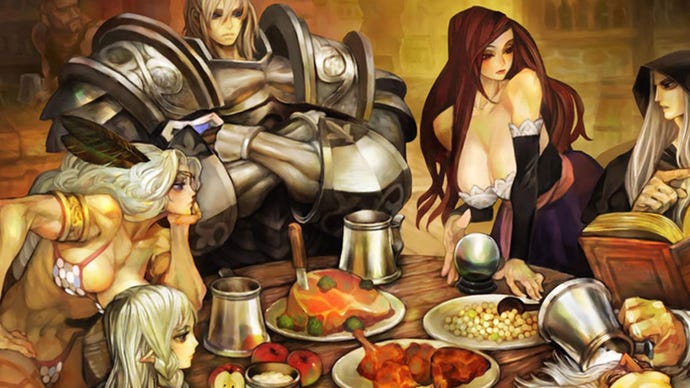
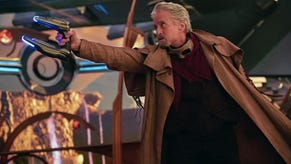
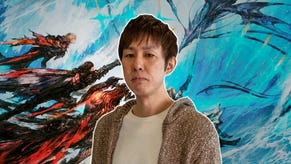



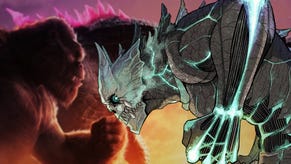
_ddwYK80.png?width=291&height=164&fit=crop&quality=80&format=jpg&auto=webp)
